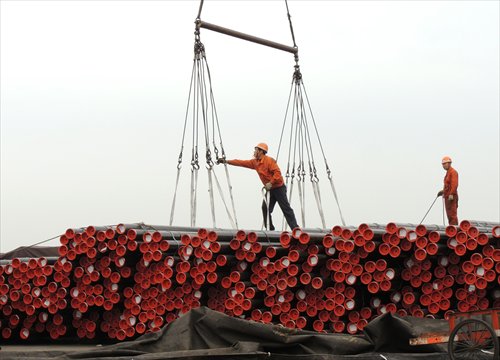EU decision seen harming China ties

Workers load a shipment of steel headed overseas at Lianyungang, a port in East China's Jiangsu Province on May 8. Photo: CFP
The EU's decision not to grant China market economy status (MES) could hamper China-EU economic and trade relations in the future, experts said Monday, while noting that China needs to push ahead with market economy reforms.
The comments came after European lawmakers on Thursday passed a non-legislative resolution saying that China has not fulfilled the EU's five criteria for MES.
According to the WTO protocol issued the year China joined the WTO in 2001, the trade body will grant the country MES on December 11, 2016 and it expects members including the EU to grant China MES by then as well.
But the EU rejected a loosening of the bloc's trade defenses against China because it wants to protect certain industries and workers in some European countries, even though the EU's economic development has benefited a lot from trade with China, experts said.
China is the EU's second-largest trading partner, with daily bilateral trade flows of over 1 billion euros ($1.13 billion). In 2011, about 3 million jobs were created in EU countries thanks to EU exports to China, the Xinhua News Agency said Sunday.
"Given the sluggish world economy, the EU is trying to protect its market by taking a protectionist stance on trade with China," said Sang Baichuan, director of the Institute of International Business at the University of International Business and Economics.
Companies from EU countries have made a lot of profit in the Chinese market and China also plans to increase investment in the EU, but Thursday's resolution will harm bilateral economic ties, Sang told the Global Times Monday, adding that the EU would benefit from closer ties with China.
China and the EU started negotiations on a bilateral investment treaty (BIT) in 2013 and some progress has been made so far. "Denying China MES will exert some negative impact on the negotiation atmosphere," He Weiwen, an executive council member at the China Society for WTO Studies, told the Global Times on Monday.
But China still cherishes its economic cooperation with the EU and will continue to make efforts to maintain and promote bilateral trade and economic relations, He noted.
'Non-standard' treatment
China's excess production capacity and the resulting cut-price exports are already having "strong social, economic and environmental consequences in the EU," members of the European Parliament (MEPs) said Thursday, pointing in particular to concerns over the effect on the EU's steel sector.
In the resolution passed Thursday by 546 votes to 28, with 77 abstentions, MEPs said that until China qualifies for MES, its exports to the EU should be treated in a "non-standard" way.
According to the WTO protocol, a member country can launch an anti-dumping probe against China and use a method not based on a strict comparison with domestic prices or costs in China if the producer under investigation cannot prove that market economy conditions prevail in the industry, Sang said, noting that this system is known as the "analogue country method."
However, if China is granted MES it would make it harder for European countries to impose anti-dumping tariffs on Chinese imports as it would change the method for determining a fair price.
Meanwhile, the troubles of the EU steel sector have not only been caused by Chinese exports, experts said, noting that weak global demand and a glut in world steel supply are also key factors.
"Chinese enterprises are expected to expand in overseas markets by improving productivity in the coming years instead of via low prices," Sang said.
"Improving technology and labor quality and lowering financing costs will help enhance the competitive ability of domestic companies," he noted.
Also, China could try to seek cooperation with the EU's steel associations to find win-win results, He said, noting that China could file an appeal to the WTO if the EU insists on sticking with the "analogue country method" with China.
Continuous reform efforts
During the last 30 years, China has made efforts to promote economic reforms and let the market play a key role in allocation of resources, experts said, while noting that further progress is still needed.
China will continue to promote its reform plans in line with the EU's MES criteria, including boosting the free flow of capital and foreign exchange, making the yuan exchange rate more market-based and deepening reforms in State-owned enterprises, according to Sang.
The country should also try to break industrial monopolies and reduce subsidies, He noted.